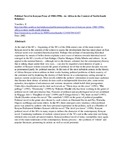| dc.description.abstract | At the end of the 80’s – beginning of the 90’s of the 20th century one of the main trends in Kenyan novel is the concern of the writers to assess the development that has taken place on East African scene over extended historical period. Perhaps this attempt of interpreting historical experience by means of belles-lettres explains a new wave of interest towards historical novel emerged in the 90’s (works of Sam Kahiga, Charles Mangua, Elisha Mbabu and others). As an appeal to the national history – although not to the distant, colonial, but the contemporary history that is taking shape under their very eyes, – can also be regarded a keen interest of quite a number of Kenyan writers towards the genre of political novel that in the prior decades was not as pronounced partly for political reasons. At the turn of the most turbulent century in the history of Africa Kenyan writers address in their works burning political problems of their country, of the continent and by depicting the destiny of their heroes in a contemporary setting attempt to analyze current social issues. Most novels exhibit the authors’ orientation towards mass audience that dictates their choice of artistic devices such as indispensable detective plot, some erotic episodes, description of adventurous and extreme situations which befall their protagonists. Under this classification can be cited such novels as “Three days on the cross” (1991), “The jailbugs” (1992), “Doomsday” (1999) by Wahome Mutahi who has been working in the genre of political novel with adventurous bias. Features of political and psychological novel are combined in Magaga Alot’s “Daughter of state” (1999) and F.Genga-Idowu’s “My heart on trial”(1997); Okoth Okombo creates his novel “The cannibals”(1995) in the genre of political pamphlet. Political novel is the genre also chosen by such writers as Diarmuid Davin and Pity Wamuhu, Ongoro waMunga and some others. In the 90’s there emerged a new tendency when political prose was joined by authors who have personal experience in the politics, such as a Member of Kenyan Parliament Mathew Karauri with his novel “The devil you know” (1996). Kenyan political novel of the 90’s in many respects defines the character of the contemporary Kenyan novel. Continuing traditions of realistic critical prose of the 70’s and at the same time not being oriented only towards advanced readers, Kenyan political novel of today exemplifies once again one of the main tendencies of the contemporary literary process – the synthesis of “elitist” and popular literature, promoting its artistic as well as social potential. | |

